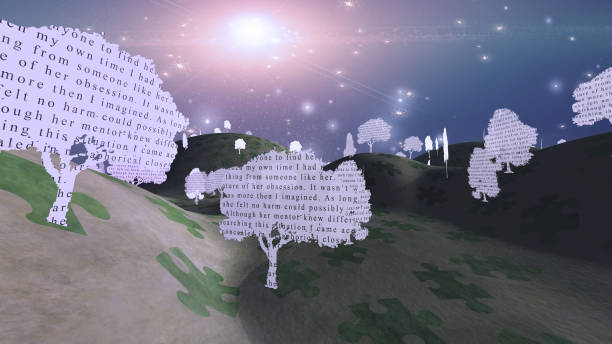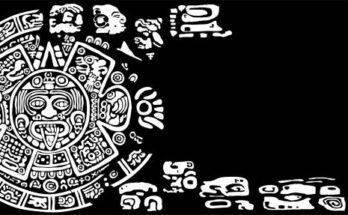Humanity has always been captivated by the mysteries of the cosmos, gazing up at the night sky and wondering about the vast expanse beyond. This fascination with space extends beyond scientific curiosity; it also delves into the realm of religion, where beliefs about what lies beyond our earthly existence are deeply ingrained. In this exploration of the intersection between religion and space, we’ll delve into the various perspectives that different faiths offer regarding the cosmos, the divine, and the ultimate purpose of our existence.
-
The Cosmic Canvas
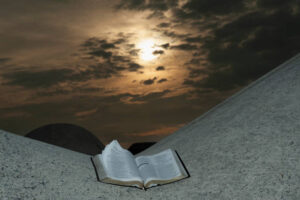 (Photo from iStock)
(Photo from iStock)
Many religious traditions have incorporated cosmological elements into their narratives, using the vastness of space as a canvas upon which they paint their stories of creation and divine purpose. For instance, in Christianity, the Bible opens with the declaration, “In the beginning, God created the heavens and the earth,” setting the stage for a cosmic narrative that shapes the Christian understanding of the universe.
Similarly, in Hinduism, the concept of “Brahman” as the ultimate reality is not confined to earthly realms but extends to the cosmic expanse, encompassing the entire universe. The Rig Veda, one of the oldest sacred texts in Hinduism, describes the cosmos as originating from the cosmic sacrifice of the primal being, Purusha.
-
The Extra-terrestrial Other
As our exploration of space advances, the possibility of discovering extra-terrestrial life becomes an increasingly plausible scenario. This prospect has prompted theological reflections within various religious traditions. How might the existence of extra-terrestrial beings align with or challenge established religious doctrines?
In Islam, the Quran describes Allah as the Lord of all worlds, implying a vast cosmic creation beyond our terrestrial abode. Islamic scholars have contemplated the potential existence of other intelligent beings within this expansive creation, speculating on the nature of their relationship with the divine.
-
The Search for Meaning
The connection between religion and space goes beyond mere cosmic curiosity. It delves into the fundamental questions of human existence: Why are we here? What is our purpose in the grand tapestry of the universe?
Judaism, Christianity, and Islam share a common Abrahamic heritage, and within this shared tradition, there is a sense of purpose tied to human responsibility on Earth. However, the vastness of space raises questions about whether this purpose is exclusive to our planet or extends to the broader cosmic landscape.
In Eastern religions such as Buddhism, the focus on individual enlightenment and the interconnectedness of all life on Earth may seem at odds with the vastness of space. However, Buddhist cosmology envisions multiple realms of existence, both physical and metaphysical, suggesting a nuanced understanding of the cosmic order.
-
Cosmic Mysticism
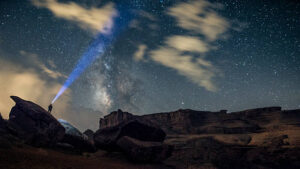 (Photo from iStock)
(Photo from iStock)
Beyond the structured narratives of creation and purpose, many religious traditions harbour a mystical dimension that seeks a direct and unmediated experience of the divine. Space, with its boundless expanse and mysterious celestial bodies, becomes a metaphor for the ineffable and transcendent within these mystical traditions.
Similarly, in certain strands of Hindu mysticism, the contemplation of the cosmos becomes a pathway to self-realization and the recognition of one’s divine essence. The image of Lord Shiva as the cosmic dancer, performing the dance of creation, preservation, and destruction, encapsulates the cyclical and transcendent nature of the cosmos.
-
Ethical Considerations
The exploration of space raises ethical questions that intersect with religious teachings. As humanity ventures beyond Earth, how should we approach the potential colonization of other celestial bodies? What ethical guidelines do our religious traditions offer in our interactions with the cosmic environment?
In Indigenous belief systems, the interconnectedness of all life is a central tenet. As space exploration advances, there is a call for respecting the cosmic balance. And acknowledging the spiritual significance of the celestial realms.
-
The Future of Religious Cosmology
As our understanding of the cosmos evolves through scientific discovery, religious cosmologies also undergo reinterpretation. The dialogue between science and religion, once marked by conflict, is increasingly characterized by mutual enrichment and dialogue. Religious communities grapple with the implications of scientific advancements, seeking to reconcile age-old beliefs with new cosmic insights.
In conclusion, the intersection of religion and space is a rich tapestry of narratives, beliefs. And reflections on the nature of the cosmos and our place within it. Whether through creation stories, contemplative mysticism, or ethical considerations, religious traditions offer unique perspectives. That enrich our understanding of the vast unknown. As humanity continues its exploration of space, the cosmic journey becomes not only a scientific endeavour. But, also a spiritual quest, inviting us to ponder the profound mysteries that lie beyond our terrestrial home.
-
Interfaith Dialogue in the Cosmic Context
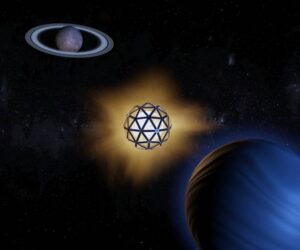 (Photo from iStock)
(Photo from iStock)
In the spirit of inclusivity, interfaith dialogue becomes crucial in navigating the cosmic context. The shared human endeavour to explore space offers a platform for collaboration among diverse religious traditions. Interfaith discussions can illuminate commonalities in the understanding of the divine and shed light. On how different faiths perceive the cosmic order. This collaborative approach fosters a sense of unity in exploring the mysteries of the universe. Transcending religious boundaries in the face of the cosmic unknown.
-
The Evolving Cosmos and Adaptive Theology
As scientific discoveries reshape our perception of the cosmos, religious theology adapts to incorporate these new insights. The dynamic nature of both science and religion allows for a harmonious coexistence. With religious interpretations evolving to accommodate expanding cosmic horizons.
-
The Cosmic as a Catalyst for Spiritual Growth
Beyond doctrinal considerations, the contemplation of space serves as a catalyst for spiritual growth. Many religious traditions encourage believers to look beyond the material world. And contemplate the majesty of the cosmos as a means of deepening their connection with the divine.
Conclusion
In the cosmic dance between science and religion, humanity finds itself at a unique juncture. Where the exploration of space becomes a transcendent journey. Evidently, religious beliefs about what lies beyond Earth’s borders contribute to the tapestry of cosmic understanding. Enriching our quest for knowledge and purpose.
Reference:
Studocu
Want to know about creation of the religion, click on the link below:
How Can Religion Be Created? Exploring the Origins and Evolution

